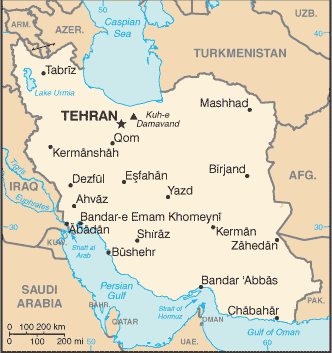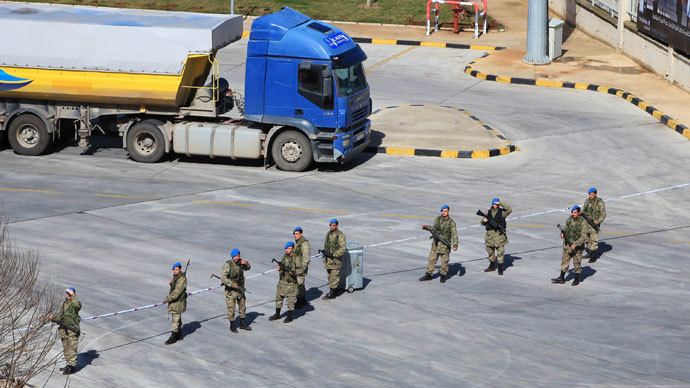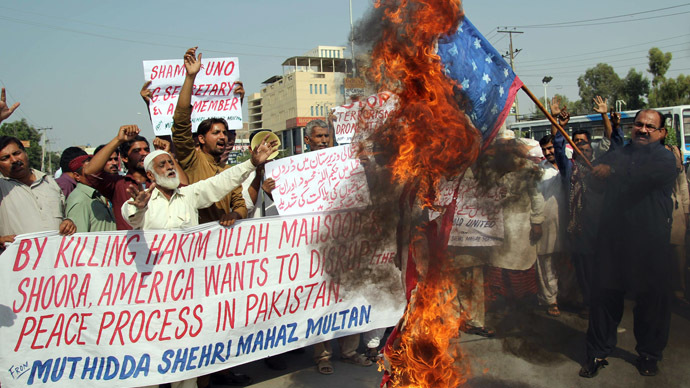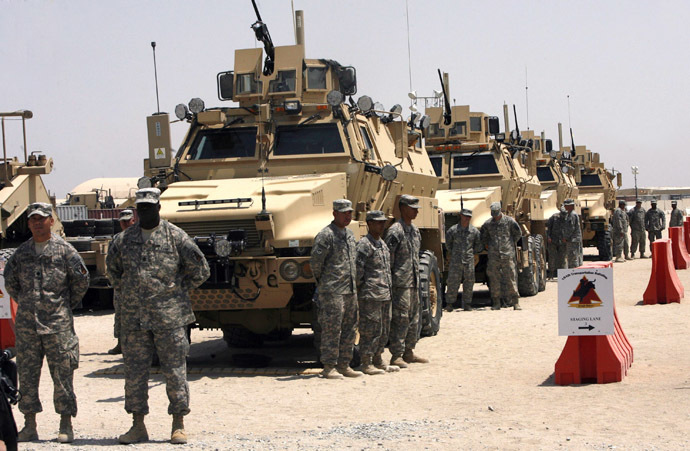http://rt.com/news/turkey-syria-chemicals-seized-207/
 The pressure is now on for Sharif to agree to shut down NATO’s supply lines through Pakistan into occupied Afghanistan, with an ultimatum from Khyber-Pakhtunkhwah’s (KP) provincial government putting a short timetable on it.
The pressure is now on for Sharif to agree to shut down NATO’s supply lines through Pakistan into occupied Afghanistan, with an ultimatum from Khyber-Pakhtunkhwah’s (KP) provincial government putting a short timetable on it.
 It was US demands that led the UN Security Council to set artificially early deadlines for several stages of the disarmament, and the OPCW has confirmed Syria has met every single one with time to spare.
It was US demands that led the UN Security Council to set artificially early deadlines for several stages of the disarmament, and the OPCW has confirmed Syria has met every single one with time to spare.
 That would be a huge leap forward, though most analysts say that all the minor details of such a broad agreement could take months to sort out, and Zarif said it wouldn’t be a “disaster” if the breakthrough didn’t come this week.
That would be a huge leap forward, though most analysts say that all the minor details of such a broad agreement could take months to sort out, and Zarif said it wouldn’t be a “disaster” if the breakthrough didn’t come this week.
Turkish patrol seizes over a ton of chemicals from smugglers at Syria border
Turkish border guards seized three vehicles loaded with over 1,000 kg of chemicals as they tried to illegally cross the border into Syria. One of the smugglers was arrested, while others managed to escape.
The Turkish General Staff reported that the chemicals were seized after a convoy of three vehicles refused to stop and attempted to illegally cross the border near the southeastern Turkish town of Reyhanli on Saturday.
Paramilitary police were ordered to shoot out the tires of the vehicles to stop them. As the tires caught on fire, the three drivers jumped out and fled in the direction of Syria. One of them was arrested.
The vehicles contained 20 bags of sulphur, weighing about 50 kg each, and eight sealed barrels. Their contents were not immediately known.
Republican People's Party (CHP) chairman Faruk Logoglu said in a statement on Monday that the barrels are suspected to contain chemical material. “Traffic was from Turkey to Syria,” he added.
The arrested suspect’s nationality has not been made public. He was taken into custody after interrogation by the Reyhanli district gendarmerie headquarters and is to be sent to the prosecutor’s office.
Chemical, biological, radiological, and nuclear defense (CBRN) units from the Disaster and Emergency Management Presidency have started examining the seized material, Logoglu’s statement said.
The Republican People's Party has also criticized the release of a primary suspect in a similar case, saying that closing the investigation would be “a shame for Turkey,” Hurriyet newspaper reported, citing CHP’s deputy.
In May 2013, Turkish police seized a group of people after being informed that Syrian rebel groups were looking to obtain materials that could be used to produce chemical weapons.
A two -kilogram cylinder with what initially was suggested to be sarin gas was seized while searching the homes of Syrian militants from the Al-Qaeda-linked Jabhat al-Nusra Front following their detention.
Paramilitary police were ordered to shoot out the tires of the vehicles to stop them. As the tires caught on fire, the three drivers jumped out and fled in the direction of Syria. One of them was arrested.
The vehicles contained 20 bags of sulphur, weighing about 50 kg each, and eight sealed barrels. Their contents were not immediately known.
Republican People's Party (CHP) chairman Faruk Logoglu said in a statement on Monday that the barrels are suspected to contain chemical material. “Traffic was from Turkey to Syria,” he added.
The arrested suspect’s nationality has not been made public. He was taken into custody after interrogation by the Reyhanli district gendarmerie headquarters and is to be sent to the prosecutor’s office.
Chemical, biological, radiological, and nuclear defense (CBRN) units from the Disaster and Emergency Management Presidency have started examining the seized material, Logoglu’s statement said.
The Republican People's Party has also criticized the release of a primary suspect in a similar case, saying that closing the investigation would be “a shame for Turkey,” Hurriyet newspaper reported, citing CHP’s deputy.
In May 2013, Turkish police seized a group of people after being informed that Syrian rebel groups were looking to obtain materials that could be used to produce chemical weapons.
A two -kilogram cylinder with what initially was suggested to be sarin gas was seized while searching the homes of Syrian militants from the Al-Qaeda-linked Jabhat al-Nusra Front following their detention.
Some of the suspects accused of establishing a connection with a network in Turkey to convey chemical materials were released after lab tests proved that the seized chemicals were not sarin gas.
The alleged use of sarin - considered one of the world’s most dangerous chemical warfare agents - in a Damascus suburb on August 21 provoked an international outcry which nearly led to a US military strike against the Syrian regime, as Western countries assumed it was the Assad government who used the chemical weapons.
However, while a UN investigation proved that sarin was used near Damascus, it did not say who was behind the attack. At the same time, Russia also analyzed samples taken in the Syrian town of Aleppo, where chemical weapons were allegedly used in March. Experts concluded that rebels - not the army - were behind the Aleppo sarin attack.
In September, Syria agreed to comply with Moscow’s offer to put its chemical weapons under international control for subsequent destruction, in order to avert a possible military strike. Damascus declared the possession of 1,300 tons of chemicals and precursors needed for chemical weapons production, as well as over 1,200 empty chemical munitions.
On Thursday, the Organisation for the Prohibition of Chemical Weapons (OPCW) said that Syria's entire declared stock of chemical weapons has been placed under seal.
The organization acknowledged that Damascus has complied with the watchdog’s requirement, adopted on September 27, for the complete elimination of chemical weapons and production units in Syria before November 1.
The process of eliminating Syria’s chemical weapons stocks has a target finish date of mid-2014.
The alleged use of sarin - considered one of the world’s most dangerous chemical warfare agents - in a Damascus suburb on August 21 provoked an international outcry which nearly led to a US military strike against the Syrian regime, as Western countries assumed it was the Assad government who used the chemical weapons.
However, while a UN investigation proved that sarin was used near Damascus, it did not say who was behind the attack. At the same time, Russia also analyzed samples taken in the Syrian town of Aleppo, where chemical weapons were allegedly used in March. Experts concluded that rebels - not the army - were behind the Aleppo sarin attack.
In September, Syria agreed to comply with Moscow’s offer to put its chemical weapons under international control for subsequent destruction, in order to avert a possible military strike. Damascus declared the possession of 1,300 tons of chemicals and precursors needed for chemical weapons production, as well as over 1,200 empty chemical munitions.
On Thursday, the Organisation for the Prohibition of Chemical Weapons (OPCW) said that Syria's entire declared stock of chemical weapons has been placed under seal.
The organization acknowledged that Damascus has complied with the watchdog’s requirement, adopted on September 27, for the complete elimination of chemical weapons and production units in Syria before November 1.
The process of eliminating Syria’s chemical weapons stocks has a target finish date of mid-2014.
http://rt.com/op-edge/us-afghanistan-pakistan-talks-288/
Fighting against peace: Why US doesn’t want an end to wars
The only surprising thing about the news that the US is sabotaging peace moves in Afghanistan and Pakistan is that anyone should find the news surprising.
As reported on RT, Pakistan has accused the US of sabotaging peace talks between the authorities in Islamabad and the Taliban following last Friday’s drone assassination of the Pakistani Taliban leader Hakimullah Mehsud.
“The murder of Hakimullah is the murder of all efforts at peace," Pakistani Interior Minister Chaudhry Nisasaid. "Brick by brick, in the last seven weeks, we tried to evolve a process by which we could bring peace to Pakistan and what have you [the US] done?"
The killing of Hakimullah Mehsud comes less than a month after the US effectively wrecked the Afghan government’s efforts to engage with the Taliban by capturing Latif Mehsud, Hakimullah’s lieutenant. Latif Mehsud was the man that the Afghan government hoped would be a go-between for peace talks with the Taliban. Afghan President Hamid Karzai was reported to have been furious about the US operation. Karzai has also said that the drone strike against Hakimullah Mehsud “took place at an unsuitable time.”
The fact is that on several important occasions in the last 30 years or so, the US has wrecked peace efforts and used its power to provoke or prolong conflicts which could have been avoided or solved without further bloodshed.
1. Iraq 1990-1991
From August 1990 to January 1991, there were plenty of chances to achieve a diplomatic solution in relation to Iraq’s invasion of Kuwait and which would have resulted in an Iraqi withdrawal, but Washington was determined to go to war. When the war started, they rejected diplomatic moves, such as the plan put forward by the Soviet leader Mikhail Gorbachev, to end the conflict before ground troops were deployed in Kuwait.
Saddam Hussein’s forces could have been removed from Kuwait without a war in which many thousands were killed, but Washington didn’t want it.
2. Kosovo
That was at the start of the ’90s. Now let‘s fast forward to the end of that decade. In order to complete the destruction of Federal Yugoslavia, Washington aggressively championed the cause of a hardcore terrorist group, the Kosovo Liberation Army, in the late 1990s. The US marginalized Kosovar leaders who wanted to pursue a peaceful path towards independence, such as the politician Ibrahim Rugova, who urged passive resistance. Instead they pushed for a violent solution to the problem of Kosovo’s status: their strategy being to provoke a retaliation from the government in Belgrade, which would then provide the pretext for the NATO bombing of Yugoslavia.
The Rambouillet Conference of March 1999 was ostensibly about trying to broker a peace deal between the Kosovar Albanian delegates and the Yugoslav authorities. But the terms were deliberately made so onerous - Appendix B allowed NATO forces freedom of movement throughout the whole of Yugoslavia - so as to guarantee its rejection by Belgrade.
“I think certain people were spoiling for a fight in NATO at that time,” revealed Lord Gilbert, a UK minister of state for defense procurement, in 2000. “If you ask my personal view, I think the terms put to Milosevic at Rambouillet were absolutely intolerable. How could he possibly accept them? It was quite deliberate.”
Even Henry Kissinger, the former US secretary of state and a man who can hardly be labeled a‘peacenik‘, admitted: “The Rambouillet text, which called on Serbia to admit NATO troops throughout Yugoslavia, was a provocation, an excuse to start bombing.”
Again, Washington had sabotaged a peaceful solution to a dispute and war ensued, with all its horrors.
3. Iraq 2002-2003
In 2002/3 we had the contrived WMD ’crisis’ with Iraq.
If Washington had genuinely been concerned about the possibility of Iraq being in possession of WMDs, they would simply have waited for Hans Blix and his team of UN weapons inspectors to finish their job. However, as we all know, the WMDs issue was merely a pretext for war, with the US knowing full well that the country was disarmed. The Iraqis were desperate to avert an attack on their country, but diplomatic offers from Baghdad in the lead-up to the illegal invasion were dismissed.
The result of the US opting for war and not peace in Iraq has been the deaths of at least 500,000 people since 2003.
4. Libya
In 2011, a UN resolution ostensibly about protecting civilians was used by the US and its NATO allies as a pretext for forcibly removing from power the government of Libya. During this ‘humanitarian’ intervention, which led to a sharp spike in the death toll, Washington and its allies frequently rejected calls for a ceasefire and a diplomatic solution. Today, Libya is - like Iraq - a wrecked country. But it all could have been very different, if Washington, instead of opting for war, had worked to bring warring factions to the negotiating table.
5. Syria
In Syria too, the US has set out since 2011 to prevent a peaceful solution to the country’s internal divisions. While an outright NATO attack on Syria has, at least for the time being, been avoided, it's been public opinion in Western countries and adroit Russian diplomacy which has prevented World War III from breaking out in the Middle East this year, rather than America’s leaders suddenly turning over a new leaf.
If the US genuinely wanted an end to the terrible bloodshed in Syria they’d be encouraging the so-called ‘rebels’ to halt their campaign of violence and sign up to the political process and contest elections.
The Baathists have made significant reforms in Syria in the past two years, not least ending the party’s near five-decade long political monopoly, but Washington hasn’t been interested in peaceful democratic change, only in the violent overthrow of President Assad and his replacement by someone who will do its bidding. The result of this policy has been catastrophic for the people of Syria who, like the people of Iraq and Libya, watch as their country is destroyed before their very eyes.
While promoting itself as the great 'peacemaker', it's the sober truth that no country has done more to stoke up conflicts and sabotage peaceful solutions to them in recent years than the US, with the killing of Hakimullah Mehsud being only the latest example.
Why does the US act in this destructive way? It’s important to understand that the US government doesn’t act in the interests of the ordinary, decent Americans, who are sick and tired of war and military ‘interventions’, but in the interests of Wall Street and what President Eisenhower famously referred to as ‘the military-industrial complex’.
The very last thing that Wall Street and the military-industrial complex want is peace. They thrive on wars and conflicts. Wars and conflicts mean profits. Nice, big, juicy profits. As Charlie Chaplin‘s anti-hero Monsieur Verdoux put it, “Wars, conflicts - it’s all business.”
Last month a report by the Public Accountability Initiative revealed that many of the leading ‘commentators’ who went on US TV stations to call for military strikes against Syria had undisclosed ties to military contractors. The report “identifies 22 commentators who weighed in during the Syria debate in large media outlets, and who have current industry ties that may pose conflicts of interest. The commentators are linked to large defense and intelligence contractors like Raytheon, smaller defense and intelligence contractors like TASC, defense-focused investment firms like SCP Partners, and commercial diplomacy firms like the Cohen Group.”
Among the 'commentators' supporting strikes on Syria was Madeline Albright, the US secretary of state at the time of the phony ‘peace’ conference at Rambouillet in 1999.
Bombing Yugoslavia, bombing Syria. With the violent destruction of Iraq and Libya along the way, to say nothing of the turmoil US policies have brought to Afghanistan and Pakistan. John Lennon implored us to ‘give peace a chance’, but until the US radically changes its political system and power is returned to ordinary people and away from those with a vested interest in endless war, its stoking up of conflicts and sabotaging of peace initiatives will only continue.
Pakistan......
Pakistani Govt Under Growing Pressure to Close NATO Supply Lines
Provincial Ultimatum May Force Sharif to Act
by Jason Ditz, November 05, 2013
Pakistani Prime Minister Nawaz Sharif has been reluctant to put any serious pressure behind his demands for the US to end drone strikes, but last week’s assassination of Hakimullah Mehsud is bringing the issue to a head.
 The pressure is now on for Sharif to agree to shut down NATO’s supply lines through Pakistan into occupied Afghanistan, with an ultimatum from Khyber-Pakhtunkhwah’s (KP) provincial government putting a short timetable on it.
The pressure is now on for Sharif to agree to shut down NATO’s supply lines through Pakistan into occupied Afghanistan, with an ultimatum from Khyber-Pakhtunkhwah’s (KP) provincial government putting a short timetable on it.
The KP government’s ruling Tehreek-e Insaf (PTI) party has given the US until November 20 to end the attacks, and has threatened their own blockade, effectively rendering the Khyber Pass unusable.
Though there is a secondary route through Balochistan, closing the major route on a provincial level would be a major embarrassment to the Sharif government, and they may ultimately decide that a nationwide closure would be more palatable.
Syria......
No Evidence, But US Keeps Expressing ‘Doubts’ on Syria Chemical Disarmament
US Says Willingness to Disarm 'Strains Credulity'
by Jason Ditz, November 05, 2013
There’s absolutely no evidence to back the allegation, and indeed ample evidence in the form of reports from the Organization for the Prohibition of Chemical Weapons (OPCW) to the contrary, but the US is still expressing “skepticism” about Syria’s chemical disarmament.
 It was US demands that led the UN Security Council to set artificially early deadlines for several stages of the disarmament, and the OPCW has confirmed Syria has met every single one with time to spare.
It was US demands that led the UN Security Council to set artificially early deadlines for several stages of the disarmament, and the OPCW has confirmed Syria has met every single one with time to spare.
Still, officials keep anonymously leaking their doubts to the press, insisting not that Syria is doing anything specifically in violation of the disarmament deal, but that they just generally don’t believe Syria would ever agree to disarm voluntarily, and is probably trying to hide some arms for the “long term” as a hedge against Israel.
Which of course ignores how chemical weapons work. The whole reason most of Syria’s arsenal is unweaponized chemicals and that the OPCW has focused entirely on destroying production capacity is because such arms have a relatively short shelf life, and can’t just get stashed in the desert for decades.
US officials set all these early dates and were prepared to condemn Syria for missing them, but now that they haven’t they’re stuck complaining about literally nothing. Meanwhile, the only real obstacles to the OPCW mission are their dwindling fundsand the difficulty of reaching sites close to US-backed rebel fighters.
| |||
Iran......
Iran: Basic Framework of Nuclear Deal Possible This Week
Iran FM Warns 'Distrust' May Slow Final Pact
by Jason Ditz, November 05, 2013
Iranian foreign Minister Javad Zarif discussed this week’s Geneva talks in an interview with France 24, saying there was a lot of distrust on both sides to be overcome, but that the basic framework of a final deal might be reached at the talks.
 That would be a huge leap forward, though most analysts say that all the minor details of such a broad agreement could take months to sort out, and Zarif said it wouldn’t be a “disaster” if the breakthrough didn’t come this week.
That would be a huge leap forward, though most analysts say that all the minor details of such a broad agreement could take months to sort out, and Zarif said it wouldn’t be a “disaster” if the breakthrough didn’t come this week.
The big obstacle to the deal remains the US Congress, as while the Rouhani government is willing to make considerable concessions on their nuclear program, they have conditioned them on the easing of sanctions, something the US Congress isbeing heavily lobbied to oppose.
The stop-gap for this could wind up being the Obama Administration simply unfreezing some of Iran’s long-seized assets, providing an influx of cash the nation desperately needs, and something the Treasury Department could do without Congress. That sort of one-off move would only go so far, however, and sooner or later the sanctions themselves need to be addressed.







No comments:
Post a Comment